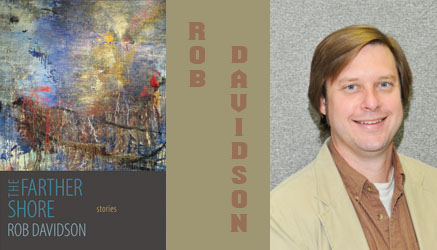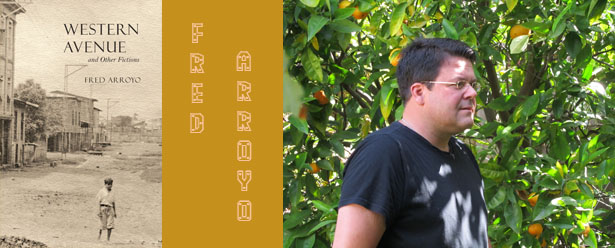Rob Davidson and Fred Arroyo
Monday May 28th at 7:30 PM
1719 25th Street
Host: Tim Kahl
Rob Davidson is the author of The Farther Shore: Stories (Bear Star Press, 2012), which includes “Criminals,” winner of the 2009 Camber Press Fiction Award, judged by Ron Carlson. Davidson’s earlier books are Field Observations: Stories (Missouri, 2001) and The Master and the Dean: The Literary Criticism of Henry James and William Dean Howells (Missouri, 2005). His fiction, essays and interviews have appeared in Zyzzyva, Hayden’s Ferry Review, Indiana Review, The Normal School, New Delta Review, and elsewhere. Davidson teaches creative writing and American literature at California State University, Chico.
The Useless Empire of Things (Excerpt from The Farther Shore)
In my dream, the baby is crying. Or, rather, inconsolably screaming: the kind of horrific blare that makes any parent cringe. Julie and I take turns trying to comfort him or her, passing the child back and forth. We try everything—a diaper change, a lullaby, a bit of breast feeding. We try the pacifier, the baby rattle, a teething ring. Stereo on, stereo off. Ditto the television. Nothing works. The baby’s lament is unceasing.
Get something, Julie orders me.
Get what? I ask.
Just get it! Now! she screams.
I am about to scream back that I don’t know what to get, but she is preoccupied with the suffering of our child. I understand it is my role to provide this unnamed thing, whatever it is.
I drive to the mall. The parking lot is empty. Thousands of vacant slots, acres of asphalt, and not one car! I park directly in front of my favorite entrance. Inside the mall, every store is open. The lights are on, the Muzak burbles like so much mental confetti, but there isn’t a single person to be found. Not one store clerk behind a cash register, or roaming the aisles. No customers perambulate the manicured walkways, thoughtfully designed to suggest a town square. From one anchor store to the next, and all the little shops in between, I can go anywhere. I can pick up anything, and I do. For instance, a gorgeous cardigan sweater. Since no one is around to ring up my sale, I walk out of the store with it under my arm, certain the alarms will blare. But none does. I grab the new Stephen Colbert hardcover from a book store, and a pair of high-end running shoes from a sports outlet, and, for Julie, a dazzling pair of Mexican silver earrings from one of those little carts punctuating the sidewalks. I am dizzy with delight at my haul. To think I can have it and no one will know!
Then it occurs to me that I have forgotten why I came there in the first place. My baby doesn’t need a wool sweater or Stephen Colbert or Mexican earrings. I don’t know what s/he needs, but I know it isn’t any of this. And while part of me thinks that nothing will be lost by keeping my little horde, it’s obvious that nothing will be gained. I drop my haul in a scattered mess and bound out the door to my car. I get in, start it up and drive at top speed across the empty parking lot, ignoring the yellow lines and arrows guiding me this way or that. I must flee this oddly useless empire of things. But as I approach the edge of the lot, I see only endless concrete curbing and beds of perfectly-trimmed hedges, mulched with wood chips, immaculate and pristine. I circle the mall, searching for an exit, but there is no way out.
Fred Arroyo is the author of the novel The Region of Lost Names (University of Arizona Press, 2008), and Western Avenue and Other Fictions forthcoming from the University of Arizona Press in the spring of 2012 as a part of its Camino del Sol series. Named one of the Top Ten New Latino Authors to Watch (and Read) in 2009 by LatinoStories.com, Fred is a recipient of an Individual Artist Grant from the Indiana Arts Commission. Currently, he is working on a book of essays in which he lyrically meditates on work, reading and writing, migration and place. He is also writing a novel set primarily in the Caribbean. Fred lives in Southern California and teaches fiction writing as Chicano and Latino literature at Whittier College. He is also a faculty mentor in the University of Nebraska MFA in Writing low-residency program.
Avenue of the Americas, circa 1952
Standing against a wall, an immaculate white cloth draped over a tray, Changó, nine years old, stands military straight, a jagged straw hat cocked on his head, a tattered shirt smudged with dirt reaching just below his elbows. Coloring the pristine white cloth, three green and red mangoes, a pair of cow shanks and hooves, a pig’s foot, a chopped-up ox tail, the translucent bones clean and vivid with blood, with the succulent morsels found there. These butcher scraps, this reprise from his sore hands in a field holding a machete. This white cloth dazzling against his dirty clothes, his eyes. Changó must’ve washed it each night in a clear running stream he heard singing of shells and stars on its shapely voyage to the sea.People pass, anticipating the briefest gestures of a hand in a pocket, the click of a gold clasp on a purse, he’s ready for this woman who stops to buy a piece for stew. A few coins shimmer on the cloth next to a pale goat’s tongue.
For a moment, beyond his memory of fields—picking thorny pineapples outside Arecibo, harvesting coffee in the mountains of Lares, cutting cane in the low fields of Añasco, selling mangoes in a plaza in the dusk—my father follows the blue cobblestones of the avenue, catches the fading sunlight still bright on the facade of a lime green house. Within the undulating grillwork of a black balcony, in those delicately rendered cast-iron vines of roses and leaves, seashells and stars, he gazes from within himself at a young boy who sees without the sting of sweat in his eyes.






